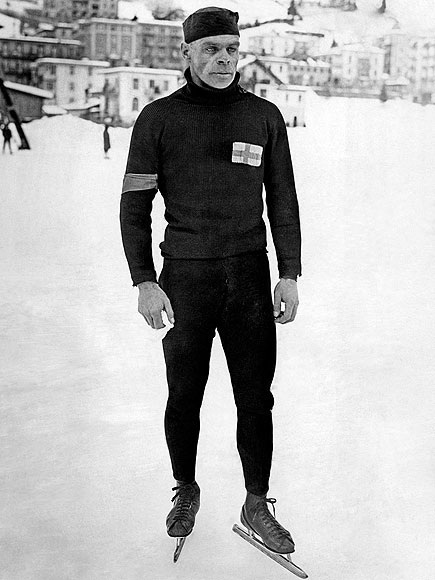Finland’s Clas Thunberg was one of the first internationally dominant speed skaters. His record of five Olympic gold medals in speed skating for men was equaled by Eric Heiden in 1980, who did it in one Olympics, but it has never been bettered. In 1924 he won the 1,500, 5,000 and the combined event, placed second in the 10K and third in the 500. Four years later, he won the 500 and defended his 1,500 crown. Further Olympic honors seemed certain at the 1932 Games but, like several leading European skaters, he refused to compete at Lake Placid as a protest against the mass-start style of racing. An unusual character, he was fiercely proud of his competitive record and was always slightly upset at not being accorded the same honors in Finland as his countryman, the legendary runner Paavo Nurmi. Thunberg made his World All-around Championship début in 1922 at the age of 28 and his final appearance was in 1935, aged 42. During this period he missed three Championships (1926, 1930, 1935) but still won 14 distance titles and was the overall champion five times (1923, 1925, 1928-29, 1931), winning silver in 1927 and bronze in 1922. He also won four titles (1922, 1928, 1931-32) and four silvers (1923-24, 1927, 1929) in all-around and 16 distance titles at the European All-around Championships. He set four officially ratified world records (and six not ratified), all of them in Davos: at 500 metres in 1929 and 1931, the 1000 metres in 1930 and the 3000 metres in 1932 when he was 38 years 278 days old and he remains the oldest man to set a world speed skating record. His 1,000 world record lasted exactly 25 years and one day, until it was bettered by the famous sprinter Yevgeny Grishin in 1955. He also won five Finnish all-around titles (1920, 1922, 1924, 1927-28). He later became a member of the Finnish Parliament (Eduskunta).
Personal Bests: 500 – 42.6 (1931); 1500 – 2:18.1 (1930); 5000 – 8:32.6 (1928); 10000 – 17:34.8 (1928).

 Finland
Finland FIN
FIN FIN
FIN